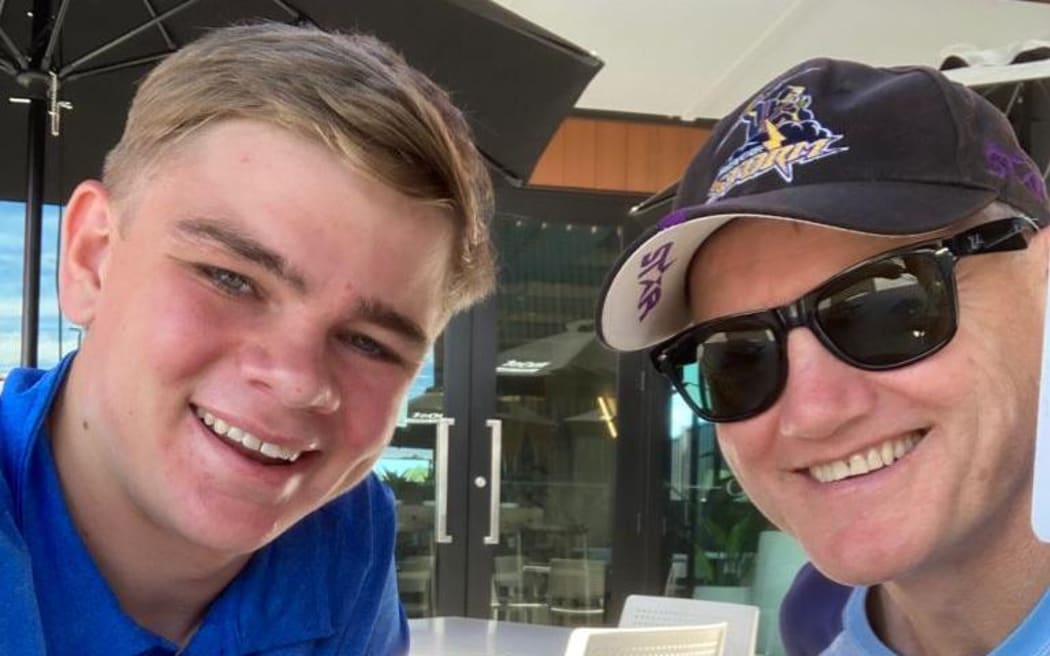All Blacks coach’s quest to raise epilepsy awareness

Joe Schmidt.
Photo: PHOTOSPORT
All Blacks assistant coach Joe Schmidt and his family are involved in an off-field battle more complicated than any he’s faced in rugby.
His son, Luke, has severe epilepsy. It’s not something Schmidt often talks about but he’s conscious that increasing the awareness of epilepsy can be a positive step toward normalising it, as much as it can be normalised.
“Luke’s condition began from a tumour that was discovered when he was five and he had the surgery to remove it pretty soon after the discovery. He’s had a number of surgeries since and medication is used to control the seizures as best they can be controlled, but they don’t stop the seizures from happening.
“Something like about four percent of people will have a seizure of some sort during their lives, but they’re not all from epilepsy. Epilepsy is the continuation and a particular type of seizure. I think there’s between 45 and 50 thousand New Zealanders that currently have epilepsy. So, it’s a lot more common than we’d first thought.”
Epilepsy is defined by the World Health Organisation as a chronic noncommunicable disease of the brain that affects people of all ages.
About 50 million people in the world have epilepsy, making it one of the most common neurological diseases.
However, epilepsy is not easy to understand, with the cause of the disease still unknown in about 50 percent of cases around the world.
Schmidt concedes the lack of clear answers can be frustrating.
“It is difficult. I remember an epileptologist once saying to me that we know more about the bottom of the ocean than what goes on between our ears.
“With the brain being so complex, we just accept that it’s difficult to know things for sure. The good thing is there are trials happening, there are new medications that potentially can help.”

Luke (L) and Joe Schmidt.
Photo: Joe Schmidt
The toll on epilepsy sufferers can be huge and isn’t always easy to measure. Schmidt admits it can be heart-breaking to witness a loved one struggling.
“Before his last surgery in 2015 Luke was having between 100 and 200 seizures a day, some of them were very small and you could hardly see them, others were full tonic-clonic*. So, compared to that he can now go a number of days in a row where he doesn’t have seizures.
“It’s really tough for Luke and it’s hard to describe for me. It’s frustrating because you can’t solve it, all you can do is support them.
“When they’re in the middle of a cluster of tonic seizures or a bad tonic-clonic seizure, all you’re doing is making sure that they are as safe as you can keep them and deal with the aftermath when they’re fatigued afterwards and frustrated and sometimes pretty sad about the limitations that epilepsy puts on their lives.”
Those limitations can be few or many, depending on the severeness of the person’s epilepsy.
Sufferers usually can’t drive, and Schmidt said Luke is restricted far more than he’d like to be
“Luke is 19 now and he’s lived with epilepsy for 15 years. As a teenager he wants to get out and about and have a lot more freedom than he’s able to have. He’s got to be within reach of his mum or me or one of his siblings because we know best how to look after him when he does seize. It’s very life limiting from that perspective.
“But he also gets to do a lot of things and he’s lived in different places around the world, and we’ve had access to some phenomenal people around the world. So, he’s accepting that it is as good as we can make it and he’s got to make the best of what that means for him.”
People with epilepsy and their families can also suffer from stigma and discrimination and Schmidt believes that increased awareness and understanding can help avoid that.
Luke has a job, working around 20 hours a week at The Landing in Taupō and Schmidt said being employed is hugely important to his son’s wellbeing.
“”It’s a situation where Luke is productively employed. He gets a feeling of independence and self-worth from that, which is fantastic.
“He works about 500m up the road from where we live. He’s worked there since it first opened 18 months ago, and his employers and work colleagues have been brilliant. He will sometimes seize at work. One time he split his head open and there was blood everywhere and that was a bit of a panic for them.
“But most of the time, we are 500m away, we can zip up, either my wife or I, and get him and if we need to administer the buccal midazolam there, or just get him into the car and get him home. We have great neighbours and if there’s only one of us, they’ll help us get him out of the car and into the house.”

Joe Schmidt, All Blacks assistant coach, Linfield Park, Christchurch, August 2022.
Photo: John Davidson / www.photosport.nz
Luke has faced and overcome many challenges and Schmidt said his family are inspired by his resilience.
“I’m impressed, but I’m also saddened by the fact that he has to cope with what he has to cope with.
“I think sometimes teenagers can become reasonably self-interested in what’s best for them or what they feel they need to get out of the world. I think if they rubbed shoulders with some of these kids who have whole different battles to fight, it would be a really good learning experience for them because for all that Luke has to cope with, he’s still an incredibly well rounded, caring kid, who copes incredibly well most of the time.”
And Schmidt is doing his best to spread awareness.
“We were involved with the Irish Epilepsy Foundation when I coached Ireland. I had a job which had a public profile, and we could let people know what it was like to have epilepsy and to try to normalise it as much as possible.
“It can be pretty scary when someone has a massive tonic-clonic seizure. For people to understand what is happening is important and to understand what they can best do to help that person.
“Even the fundamentals of not putting your hands in their mouth, not worrying about them swallowing their tongue. Just making sure that you move objects out of the way and that they can be safe during the seizure. If they’ve got a medic alert bracelet or if they have an intervention medication like a buccal midazolam that we use, then helping to make sure that can be administered so that hopefully the seizure will die down and that the epilepsy will be contained, and they can recover from the seizure without harm.”
Former Ireland coach Schmidt is set to finish up as an All Blacks assistant after this year’s World Cup and is no doubt fielding offers from around the world.
Schmidt said Luke loves his current job and said his family’s happiness will dictate what he decides to do next.
“If we head back overseas at some point, and there are opportunities, if that happens, that would be a condition of the job, that there would be something lined up for Luke so that he could continue to feel that sense of independence.”
Schmidt doesn’t know if Luke will ever be seizure free, but he hopes so.
“You have to, I guess. But we’re also pretty realistic. My wife Kelly and I are pretty pragmatic people, and we understand the chances of that are very slim.”
*What is a tonic-clonic seizure?
The Epilepsy Foundation describes tonic-clonic as the type of seizure that most people think of when they hear the word “seizure.” Tonic-clonic seizures involve both tonic (stiffening) and clonic (twitching or jerking) phases of muscle activity. This type of seizure was called “grand mal” in the past. During the tonic stage, a person will lose conciousness and can fall to the floor. After the tonic phase comes the clonic phase. The arms and usually the legs begin to jerk rapidly and rhythmically, bending and relaxing at the elbows, hips, and knees. After a few minutes, the jerking slows and stops. The person’s face may look blue if they are having trouble breathing or the seizure lasts too long. These seizures generally last one to three minutes. Afterwards, the person may be sleepy, confused, irritable, and/or upset.
What to do if you see someone having a tonic-clonic seizure?
The Epilepsy Foundation has the following advice: Ease the person to the floor. Turn the person gently onto one side. This will help the person breathe. Clear the area around the person of anything hard or sharp. This can prevent injury. Put something soft and flat, like a folded jacket, under the person’s head. Remove eyeglasses. Loosen ties or anything around the neck that may make it hard to breathe. Time the seizure. Call for an ambulance if the seizure lasts longer than 5 minutes. Stay with the person until the seizure ends and he or she is fully awake. After it ends, help the person sit in a safe place. Once they are alert and able to communicate, tell them what happened in very simple terms. Comfort the person and speak calmly. Check to see if the person is wearing a medical bracelet or other emergency information. Keep yourself and other people calm.
What you shouldn’t do: Do not hold the person down or try to stop his or her movements. Do not put anything in the person’s mouth. This can injure teeth or the jaw. A person having a seizure cannot swallow his or her tongue. Do not try to give mouth-to-mouth breaths (like CPR). People usually start breathing again on their own after a seizure. Do not offer the person water or food until he or she is fully alert.
For all the latest Sports News Click Here
For the latest news and updates, follow us on Google News.
